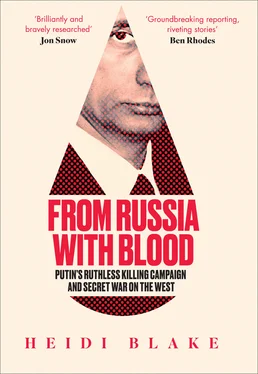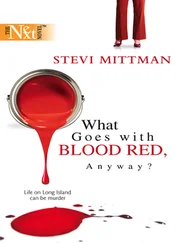Litvinenko never established for sure who was behind the attack on Berezovsky. Nor was Sylvester’s murder ever solved, although rumors swirled in the Moscow underworld that he had faked his own death and skipped the country. But Berezovsky was taken with the conscientious young officer, with his keen blue eyes, boyishly short-cropped sandy hair, and exact manner. The pair exchanged telephone numbers and agreed to stay in touch.
Litvinenko was an anomaly among Russia’s state security officials. He was an idealist, a teetotaler, and a stickler for law and order—all rare qualities in post-Soviet Moscow. He’d cut his teeth in the chaotic final days of the KGB in his early twenties, and after the old state security apparatus was dismantled, in 1991, he’d won his dream job as a major in the organized crime unit of the FSB.
Underneath his orderly exterior Litvinenko was a live wire, prone to fits of great excitement and passion, but his training at the KGB’s academy had taught him to direct that energy with pinpoint precision. He was fanatical about record keeping, maintaining an immaculate notebook that he loved to show off to fellow detectives, and neatly filing every document he gathered as he investigated the messy business of the Russian mob.
Work had always been Litvinenko’s first love, but recently he’d found another grand passion worthy of his high-octane energy. His new fiancée, Marina, was a hypnotically elegant ballroom dancer with smoky blue eyes and high Slavic cheekbones, and he’d pursued her with all his boyish vigor after they met at a friend’s apartment, turning up unannounced with gifts of flowers and bunches of bananas, her favorite fruit. After a dizzying romance, she had just given birth to their son, Anatoly, and now the couple were getting ready to marry. But just as life at home was settling perfectly into place, all his security in the job he loved started suddenly to unravel.
Litvinenko was gathering mountains of explosive dirt on the activities of Russia’s biggest mobsters as he eavesdropped on their phone calls, recruited informants from within their closest circles, and studied their connections with politicians and officials. And as he delved into the activities of one particularly powerful criminal network, he made a series of disturbing discoveries that shook his faith in the new Russia.
Litvinenko had unearthed evidence that the Tambov gang was working in cahoots with state security officials to smuggle heroin into the St. Petersburg seaport and onward to western Europe, operating under the protection of powerful figures within the city administration. As he dug deeper, one name kept coming up: Vladimir Putin.
Putin was a KGB man in his blood and bones. He had dreamed of joining the Committee for State Security since he was a little boy hooked on the Soviet spy series The Shield and the Sword, and he got a place at the KGB academy in his hometown of Leningrad (the Communist name for St. Petersburg) as soon as he could, in 1975. After graduating, his first job was to spy on foreign diplomats in the city before he was posted to Dresden, East Germany, to work undercover as a translator. It wasn’t a particularly glittering start to the career of a lifelong KGB groupie. Dresden was on the wrong side of the Iron Curtain: the real cloak-and-dagger adventure was happening over the wall, in the West, where agents could move invisibly among the enemy. Putin had hoped his spell in the East was just a precursor to greater things—but then disaster struck. When the Berlin Wall fell, in 1989, he was sent packing back to Leningrad, to a dull post grooming new recruits at the state university. From there, he watched with horror as the entire Soviet state disintegrated around him and his beloved KGB was destroyed.
As the ramparts crumbled and Russia lurched toward its capitalist destiny, KGB officers were encouraged by their superiors to forge links with the mafia. The mob understood global market forces better than anyone, and it was clear that the criminal kingpins would rank among the real rulers of the reformed Russia, so the KGB moved to align itself with the new seat of power. The evidence Litvinenko was unearthing *suggested that Putin and a Leningrad KGB colleague called Viktor Ivanov had obeyed that diktat—by going into business with the Tambov gang.
Ivanov was a dashing young officer with an insouciant eye who boasted a more swashbuckling KGB career than Putin did, having served two years in Afghanistan during the Soviet-Afghan War. Litvinenko’s information suggested that in the dying days of the KGB, Ivanov had forged close ties with the leader of the Tambov gang—Vladimir Kumarin—and he had brought Putin into the action. The Tambovs were locked in a bloody turf war for control of the St. Petersburg seaport with the rival Malyshev gang, and it seemed Ivanov had sided with Kumarin, marshaling the resources of the KGB to help him drive out the enemy and consolidate the Tambovs’ control of the city. From then on, according to Litvinenko’s evidence, Ivanov became a key lieutenant of Kumarin, assisting him with his operations smuggling heroin into the port as well as bolstering the gang’s other lucrative lines of business: arms smuggling, human trafficking, racketeering, extortion, and contract killings. Putin, meanwhile, appeared to have been enlisted to help whitewash the profits: he was on the advisory board of a sham real estate company called SPAG, which seemed to have been set up by Kumarin to launder Colombian drug money.
When the KGB fell, in 1991, Putin and Ivanov appeared to have taken their Tambov connections with them. Ivanov went to work for its immediate successor, the FSK, and the evidence suggested he had continued to use the state’s resources to help Kumarin flood St. Petersburg with narcotics. Putin, meanwhile, had won himself a place in the mayor’s administration and it looked like he was using his new role in the city government to protect Ivanov and Kumarin from official scrutiny. Litvinenko was sure he had hit on something big, and he intended to keep digging. The young officer had no idea how deadly his discovery would one day prove to be.
Mayor Sobchak had warmed instantly to the sober, diligent new functionary at city hall, who kept his head down and let his boss shine. Putin’s fluency in German was a boon as St. Petersburg opened up to the world along with the rest of the country, and he was soon made the head of the mayor’s committee for external relations in charge of attracting foreign investment.
St. Petersburg was by then in the grip of a crippling food shortage caused by hyperinflation—and Putin soon found that out of every crisis comes opportunity. The local government had been granted federal permits to export oil, timber, and metals to be bartered abroad in exchange for meat, fruit, and sugar for the hungry population, and it was his job to distribute export licenses to local companies. Raw materials worth $100 million were shipped out of the city under his watch—but, oddly enough, the companies to which he awarded the permits all shut down right after the cargo set sail. That left no one to hold accountable when the goods disappeared and no food ever arrived in return.
The export imbroglio caught the attention of Marina Salye, a redoubtable city council deputy who had made it her business to root out corruption in St. Petersburg. When the food failed to arrive, she opened an investigation. Salye suspected that Putin and his cronies had pocketed the goods for themselves while the people of the city starved, and her inquiry led to a city council vote recommending that prosecutors investigate him for embezzlement. But Putin angrily denied any wrongdoing, blaming the failure on the now-defunct companies, and he would never be prosecuted, because Sobchak stood in the way.
Читать дальше












